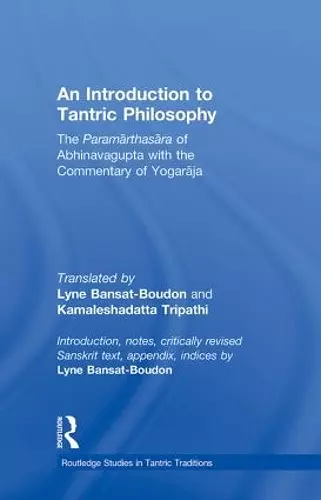An Introduction to Tantric Philosophy
The Paramarthasara of Abhinavagupta with the Commentary of Yogaraja
Lyne Bansat-Boudon author Kamalesha Datta Tripathi author
Format:Hardback
Publisher:Taylor & Francis Ltd
Published:17th Sep '10
Currently unavailable, and unfortunately no date known when it will be back
This hardback is available in another edition too:
- Paperback£39.99(9780415836951)

The Paramārthasāra, or ‘Essence of Ultimate Reality’, is a work of the Kashmirian polymath Abhinavagupta (tenth–eleventh centuries). It is a brief treatise in which the author outlines the doctrine of which he is a notable exponent, namely nondualistic Śaivism, which he designates in his works as the Trika, or ‘Triad’ of three principles: Śiva, Śakti and the embodied soul (nara).
The main interest of the Paramārthasāra is not only that it serves as an introduction to the established doctrine of a tradition, but also advances the notion of jiv̄anmukti, ‘liberation in this life’, as its core theme. Further, it does not confine itself to an exposition of the doctrine as such but at times hints at a second sense lying beneath the evident sense, namely esoteric techniques and practices that are at the heart of the philosophical discourse. Its commentator, Yogarāja (eleventh century), excels in detecting and clarifying those various levels of meaning. An Introduction to Tantric Philosophy presents, along with a critically revised Sanskrit text, the first annotated English translation of both Abhinavagupta’s Paramārthasāra and Yogarāja’s commentary.
This book will be of interest to Indologists, as well as to specialists and students of Religion, Tantric studies and Philosophy.
"Clearly, Sanskrit scholars and the growing coterie of serious students of Śaivism will profit greatly from a close study of Bansat-Boudon’s notes and other supplemental materials; yet, this volume also will be of use to those with less than a professional commitment to the study of Śaiva materials, as the clarity of the authors’ translations affords an easy access to the subject, even, perhaps especially, for those who do not read Sanskrit. Certainly, then, every college and university library worth its salt should own a copy, but I also imagine—and hope—the readership of this outstanding text will extend to a wider audience, beyond the confines of academia."
John Nemec, University of Virginia
Journal of the American Oriental Society 135.2, pages 343-345 (2015) 343
ISBN: 9780415346696
Dimensions: unknown
Weight: 1050g
480 pages